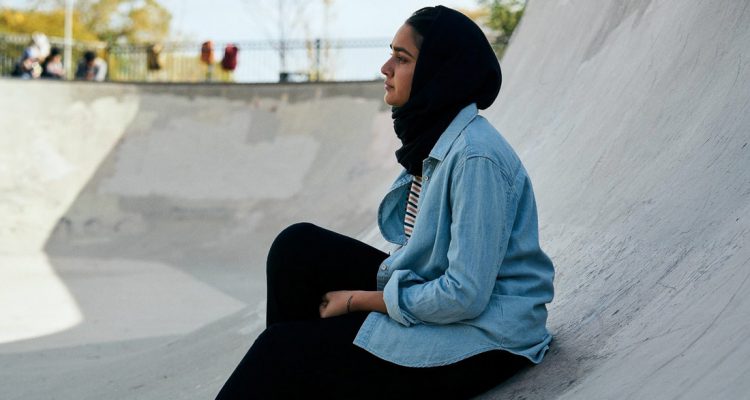It opens with a prayer, and then cuts to an orgasm – an awfully efficient illustration of the contradictions in its protagonist’s life. Her name is “Hala,” she’s a high school senior, and while an honest portrait of a genuine teenager is rare enough, I’m not sure we’ve ever seen a movie like this about a Muslim teen. But Minhal Baig’s tender coming-of-age drama isn’t just a matter of novelty or even representation (though it is fascinating to observe the logistics of just going about a day: wrapping her head, changing for gym class in a stall, etc.). This is a still a universal story, because most of us can identify with feeling like an outsider in our high school, falling in love for the first time, or discovering that our parents are more complicated than we thought.
READ MORE: Sundance 2019 Film Festival Preview: 25 Must-See Films
At the beginning, they seem pretty easy to peg. Hala (Geraldine Viswanathan) is very much a daddy’s girl, and her father (Azad Kahn) dotes on her, asking for help with the crossword puzzle during breakfast and bragging that she got her brains from him. Her mother (Purbi Joshi), who only speaks to her in Urdu – Hala replies in English, her mother responds in Urdu, and this is just how they talk – is far more traditional, and thus distant. “Dad and I won’t always be there to protect you,” she warns her daughter. But by the end of this story, all of their relationships will change, possibly forever – and not just Hala’s with each of her parents, but theirs with each other.
Much of that upending is due to Jesse (Jack Kilmer), who will become Hala’s first boyfriend, and one of the miracles of the film is how Baig captures the wonderful idealism of a first relationship: the particular way she smiles as she looks at his Facebook pictures, how each of them seem to say all the right things to each other, how everything about this boy just seems… perfect. Baig’s script has the kind of intimacy that is too often passed over in favor of melodrama or cynicism, but it’s only because of that intimacy that she can stage their sex scene with the kind of low-key hyper-reality that she does. Seldom has a movie captured both the excitement and the horror of losing one’s virginity.
READ MORE: The Most Anticipated Films By Female Filmmakers In 2019
In that scene and elsewhere, Viswanathan’s performance confirms what 2018’s “Blockers” suggested: this is a movie star in the making. Behold the look on her face when she abruptly volunteers a “You’re so cool” to Jesse, far too early to blurt out her truth; watch the way she listens to her parents talk (and sing) from the backseat of their car; witness the raw, searching power of her breakdown after a family dinner that’s doubling as an arranged date. Viswanathan has a wonderful, open, expressive face, and she wields it without ever veering into overacting. In scene after scene, she just breaks your heart.
She’s the ideal vessel for Baig’s sensitive script and soaring direction. Some of the pieces don’t quite snap into place – a subplot with a friendly teacher is strangely fumbled, and Anna Chlumsky only has one important scene, which is egregious underuse – but that’s mostly nitpicking. This is a confident feature debut, and Baig fills her frame with potent, loaded images (there’s a moment of Hala both kneeling and weeping on her prayer rug that will stay with me for a good, long while) and puts across a clear vision; Carolina Costa’s cinematography is both moody and naturalistic, and Mandy Hoffman’s score is an elegant and occasionally unnerving counterpoint (and a relief, considering how easy it would be to score this story with the kind of easy, push-button, “feel this” music that’s infested indie drama as of late).
“Hala” is keenly observed and quietly powerful, and we’ll be hearing much more from the talented women on either side of its lens. [A]

